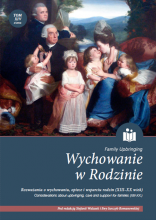Troski i radości chłopskiej rodziny galicyjskiej na przełomie XIX i XX wieku w świetle źródeł pamiętnikarskich
The worries and joys of the Galician peasant family at the turn of the 19th and 20th centuries as presented in memoir research
Author(s): Elżbieta DolataSubject(s): Education, Sociology, Social history
Published by: Zakład Historii Edukacji w Instytucie Pedagogiki Uniwersytetu Wrocławskiego
Keywords: education history; Galicia; family; family upbringing; upbringing in the 19th and 20th centuries
Summary/Abstract: The life of Galician families was described in many memoirs, diaries or autobiographies.These sources constituted the basis for at attempt to depict the everyday life of peasant families, which were predominant in Galicia social structure at the turn of the 19th and 20th centuries. The material subject of the analysis comprised peasant memoir publications and the objective was to find out what habits, duties, worries and joys were typical of the Galician people and, to evaluate them with respect to the opportunities and threats for the family at that time. Peasant literature appears to be a precious source of documents that show the changes occurring over the years in the Galician villages. The authors of the texts, who not only witness various events but also participate in them, go back to their earlies memories, which gives an idea of what constituted the characteristics of people’s life at that time. The texts which provided the material for analysis included, but were not limited to, the following authors: Walenty Kunysz, Ferdynand Kuraś, Franciszek Magryś, Jan Stryczek, Jan Słomka, Wincenty Witos, Roman Turek, Stanisław Pigoń and Władysław Fołta. The picture of Galician family life drawn from their memories is rather sad and gloomy. Each family had its own worries resulting mainly from poverty, the burden of household duties or poor health. But parallel to those worries, as the memoir authors point out, were also some joyful moments connected with celebrations, traditional ceremonies and customs. Thanks to such moments, Galician families could cope with everyday responsibilities and contribute to keeping traditions alive and maintaining their national identity.
Journal: Wychowanie w Rodzinie
- Issue Year: XIV/2016
- Issue No: 2
- Page Range: 281-305
- Page Count: 25
- Language: Polish

